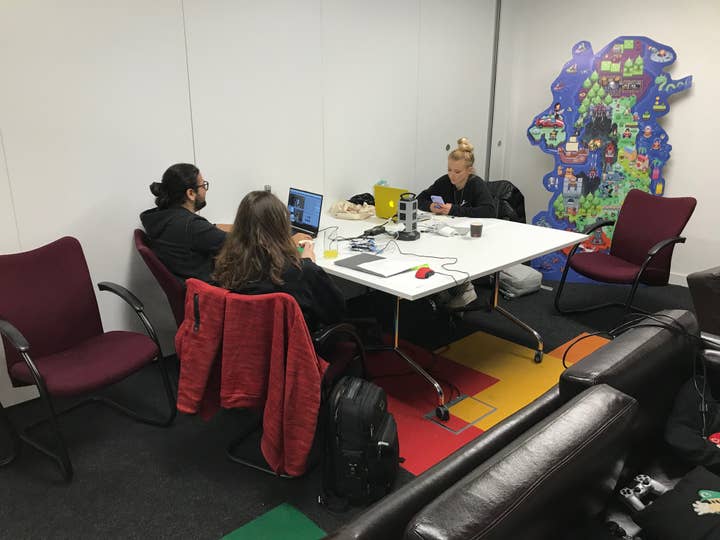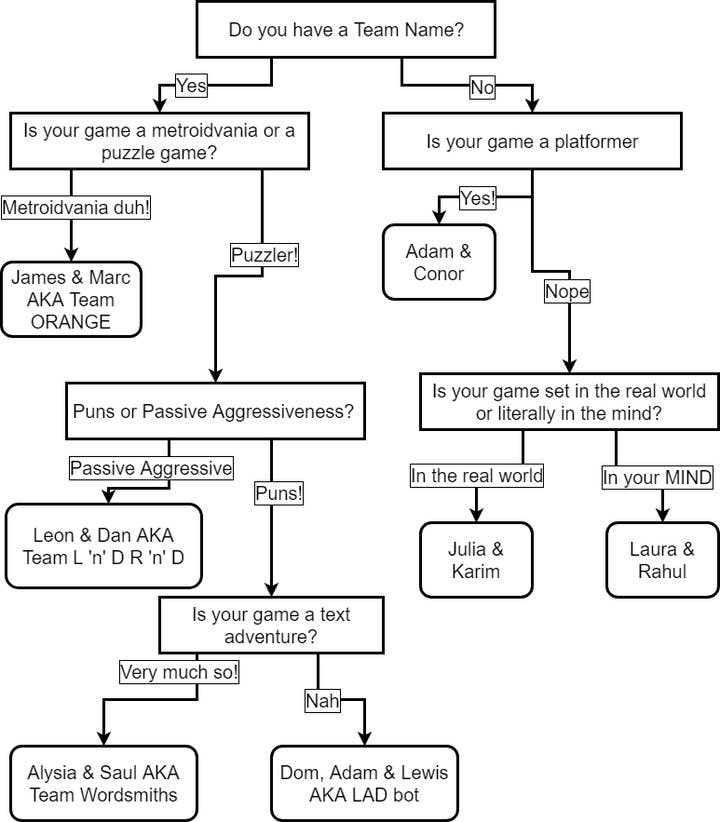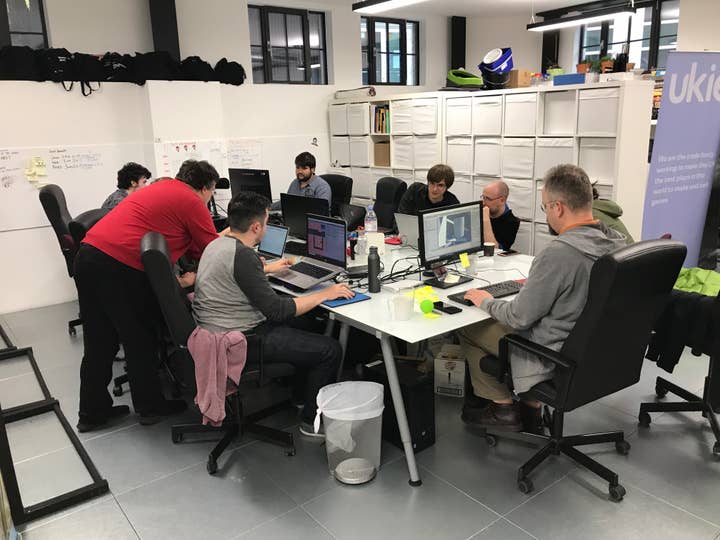JournoDevSwap 2019: Day Two
More developer-written reports from this weekend's special game jam - complete with team-identifying flow chart
It's Day Two of JournoDevSwap 2019 and both developers and journalists have been hard at work, making the most of the game jam's longest day.
In case you've missed the news, JournoDevSwap is a game jam where the press and game makers swap roles. It's hosted at UKIE and supported by Alzheimer's Research UK. The charity also set this year's theme: the brain.
You can read the first developer-written reports here, and catch up on today's progress below.
Journalistic Ingenuity
By Kat Welsford, Bossa Studios
Arriving at any event where you don't know anyone is intimidating.
In a room full of faces you don't recognise, with no idea who these people are. Sometimes the people have seen you online before, they've seen your face in a video or a photograph and greet you with a smile you can't echo. They know you before you know who they are. They act like you've been friends for years, and you've just got to assume that's how they just are -- everyone's best friend, and you follow them because you don't know any better.
"Journalists aren't your typical gamers, and they're not your typical game developers"
Maybe you met them at an event where you were distracted, and you feel like you know them from somewhere but can't remember where. Maybe you know their voice from somewhere, but you just can't place it.
Potentially you've spoken to them thousands of times on Twitter or email, had in depth conversations with them but never seen them. You might feel like their eyes remind you of your preschool teacher, and their smile of your ex-girlfriend. Their laugh reminds you of that one colleague you worked with two jobs ago who left without saying goodbye.
Arriving at the JournoDevSwap, it was intimidating, but we got over it, talking and chatting, interviewing, heading to grab breakfast, solving problems, sharing information. Everyone was welcoming and by the time we had to start writing, the conversations flowed naturally.
Alzheimer's disease, like most diseases affecting the mind, are difficult to truly understand just from hearing about them. You read the words on the page -- and understand -- but it doesn't totally explain how it affects people. Alzheimer's Research UK, the UK's leading dementia research charity, is working to change that. And that's what today's game jam is in the aid of -- finding ways to show how Alzheimer's can affect you in a more interactive format.
Journalists aren't your typical gamers, and they're not your typical game developers. With a couple of days of Unity knowledge split between the seven of them, they set about with their student team-mates to make games to change the world. No pressure there then!

A Metroidvania where you play an orange is not the first thing that comes to mind when you say 'gaming'. Made by Team Orange (consisting of James and Marc), you go through the brain and fight corruption in a platformer. Designed to look like the ridges on the outside of the brain, you need to move from lobe to lobe, finding switches to open the doors to the next level, reconnecting the lobes of the brain. Despite having no experience in Unity, James has gotten hands on with the engine side, laying out maps and teaching himself little hacks to optimise the level creation late into the night.
Laura decided to go very literal -- you are in a brain and you've got to work to find the correct information. Find the correct face in the room you store faces, find the correct name for the object in the names room, find the keys in the object room. As you advance throughout the levels, the information becomes more random, your speed becomes slower, sometimes the room just doesn't exist anymore. Despite not having a huge amount of time, Laura and her team-mate Rahul have big plans, which hopefully by tomorrow can be realised into a working vertical slice.
"With more experience as a general journalist, Adam's ideas tend towards the more scientific, simulating neurons between the 'areas' of the brain"
In a similar vein, Julia and her teammate Karim are working on a game based on the simple task of leaving the house. Getting up, getting dressed, picking up your keys, but becoming much more difficult as you go on. Developing on a more typical team setup, with Karim writing code, and Julia designing, the game is based a lot more in the real word compared to the rest of the games that the teams have developed. The game itself shows a lot of promise, changing the world every iteration, and making simple things challenging, but with a lot more subtlety compared to most games of this ilk.
Dom, alongside his teammates Lewis and Adam, have taken the real world to the logical extreme -- Robot presidents in 2600 with a branching ending, good, neutral and bad, depending on if you manage to save the robot from its own brain before the peace summit at the UN. Inspired by Blade Runner and Thief, you are one of the top robot surgeons trying to repair the President of the United States of Europe. Spending a lot of time on art and music, Dom's game is incredibly stylized on the second day, much more than what you'd expect from two days of work.
Going more into the concepts of fractured memories, Adam and Conor are working on a platformer, trying to fix a shattered memory. With more experience as a general journalist, Adam's ideas tend towards the more scientific, simulating neurons between the 'areas' of the brain, developing a slightly more technical model of the brain.
Leon and his teammate Dan went down a similar route, rebuilding images from birth to death, trying to place the objects into pictures to understand how the pictures fit, forcing you to think accurately so the memories don't degrade. A true puzzler, the game encourages you to try and ensure the correct object fits the correct memory. A beautiful game, with hand drawn artwork, this game is a memorable reminder of the key aspects of life, and, at the time of writing, one of the most polished.
Alysia alongside her teammate Saul, are working on a more minimalist game, with a text-based game where you need to find the complete sentences from a pool of words. A story-based thriller, where you wake up seeing people who don't know who you are, but they know who you are. Told through a typewriter, this game requires you to piece together information to figure out if you should fight these people, or embrace them as your friends. Edging towards horror, this game is the spookiest, making you question your own reality.
Kat also created something a little more playful when she was exploring what kind of article she wanted to create. Introducing the 'Journo/Dev Swap 'Which Team Are You?' Flow Diagram'...

Games Journos Share Their Game Jam Tips
By Tim Constant, Panic Barn
The list of amazing games that sprout from game jams is long.
Superhot, Surgeon Simulator, Snake Pass and Goat Simulator to name but a few. All share tight gameplay mechanics that bubbled up in a melting pot of intense development pressure.
At the UKIE London Studios, JournoDevSwap 2019 was underway. To raise awareness of Alzheimer's Research UK a number of journalists were given the opportunity to experience this burst of compressed development. Create a game from conception to launch, in 48 hours. The theme: the brain.
Game development -- and thus a game jam -- is a roller coaster of highs (from the initial thrill of spit-balling concepts and the endorphin release when something just works) and lows (self-doubt, cutting features, and crippling bugs). But the journalists turn devs had already identified some essential game jam tips to help them cope with the process:
"Game development -- and thus a game jam -- is a roller coaster of highs and lows"
1. The power of pen and paper
Leon Hurley and Dan Ryan used pen and paper to prototype and map out their puzzle game where a fog of war represents the effects of Alzheimer's on the player as they age in-game. Large sheets of paper laid out the game progression and allowed them to quickly and clearly identify areas of feature creep.
2. Sleep is your best friend
Laura Kate Dale and teammate Rahul Sharma found it hard to switch off after the first day's intense session. They were creating Untitled Room Game, a 3D walking simulator where the player attempts to find and recall memories. The temptation to push on with development late at night was high but complex problems can become simple after a good night's sleep. Resisting the temptation to late night tinker was essential.
3. Take breaks often
James Batchelor, Gamesidustry.biz UK editor and teammate Marc Walker were creating a Metroidvania. The scope was large. A multi-roomed 2D pixel art brain which the player must navigate. Taking breaks between tasks allowed time to pause and consider the best approach to a problem.
4. Communication is key
BBC radio journalist Adam Rosser and teammate Conor Preston, were creating Fractured. The player must recreate broken images within a 3D space, reflecting the impact of Alzheimer's visually. Adam noted finding out Conor's skillset (3D modelling) early was essential and allowed them to focus on the gameplay, which lead to fast iteration.
5. Collaboration between rival teams
Presenter, writer and producer Alysia Judge and teammate Saul Barrerre were creating a 2D narrative word game which aimed to recreate the effect of concussion on the brain. Alysia and Saul the programmer soon identified their limitations; art. A quick collaboration with a fellow team meant a key visual piece for the game, a typewriter was delivered. Although rivals, collaborating with your fellow teams is essential to fill in missing skillsets.
6. No dithering
Dom Sacco, esports journalist, revealed time is truly of the essence. You have no time to procrastinate. Every minute conceptualising an idea is a minute lost of dev. Dom and Lewis Rean -- team Ladbot -- were creating a brain repair simulator where navigating complex mazes under time pressure can lead to the player saving the world. The overall theme was locked down very quickly allowing development to begin as soon as possible.
7. Have Fun
Journalist Julia Hardy and teammate Karim Ajouz created a game focused on how simple tasks can often feel impossible after the effects of Alzheimer's. In this case the player must attempt to leave their home. Julia states the topic of your game has to be of interest; and Marc Walker teammate to James Batchelor echoed this sentiment. Game jams should be fun, regardless of the end-product; the process should be fun.

